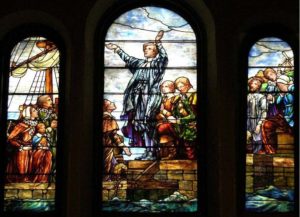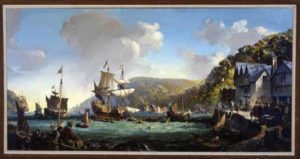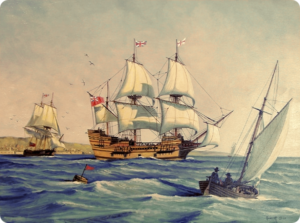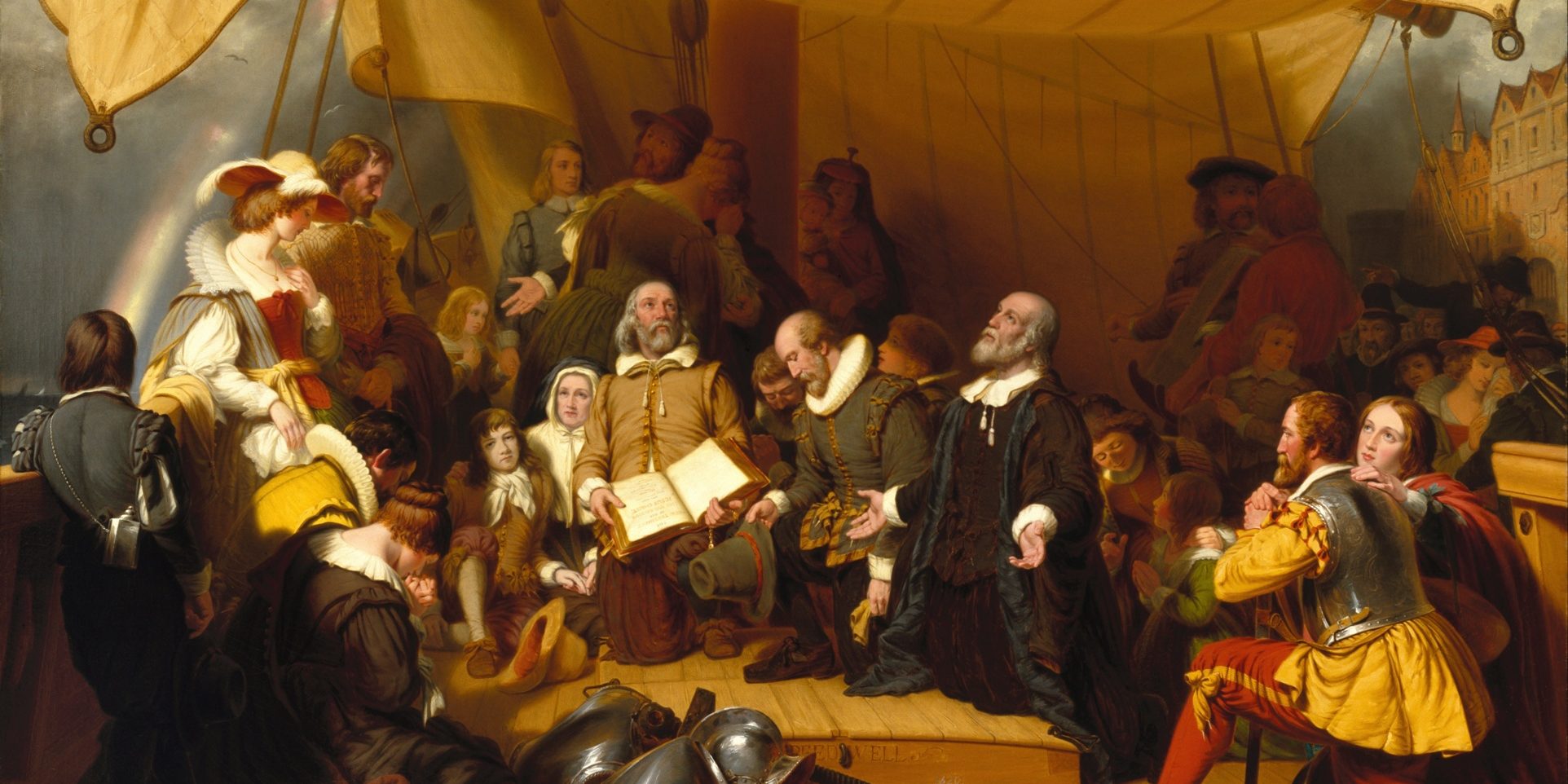Members of the Leiden Congregation knelt in prayer on the deck of the Speedwell on Wednesday, July 22nd in Delftshaven, Holland. This was captured by artist Robert Weir and shows Pastor John Robinson (with hands outstretched) and William Brewster (holding the open Geneva Bible) and several parents and children in prayer.
The Speedwell, a 60 ton pinnace (ship) built in 1577 was originally named Swiftsure. The Mayflower, by contrast, was a 180 ton cargo ship built in 1608. The Mayflower was three times the size of the Speedwell and 30 years younger! In 1586 the Swiftsure was used in the vanquishing of the Spanish Armada. If the Armada had succeeded, the Separatist movement may have ended three decades earlier! In 1605 the Swiftsure was decommissioned and renamed Speedwell.
Bradford relates that when those from Holland arrived in Southampton, “After a joyful welcome and mutual congratulations… they fell to parley about their business… about the alteration of the conditions.” John Carver said he had no knowledge of the changes in the contract. Robert Cushman “answered he had done nothing but what he was urged to, partly by the grounds of equity and more especially by necessity, otherwise all had been dashed and many undone.” Thomas Weston (their agent) was offended by their displeasure at his contract (which favored the investors). Bradford relates that “this was the first ground of discontent between them.” They were forced to sell off supplies and had no choice but to accept the changes which caused them to work in community with no personal incentive and to do so six days a week without any day for personal profit.
 It was providential that at this time, before they departed, “the company was called together and this letter read amongst them, which had good acceptation with all, and after fruit with many.” Pastor John Robinson’s letter of advice detailed the following:
It was providential that at this time, before they departed, “the company was called together and this letter read amongst them, which had good acceptation with all, and after fruit with many.” Pastor John Robinson’s letter of advice detailed the following:
“And first, as we are daily to renew our repentance with our God, especially for our sins known, and generally for our unknown trespasses… Now, next after this heavenly peace with God and our own consciences, we are carefully to provide for peace with all men what in us lieth, especially with our associates. And for that, watchfulness must be had that we neither at all in ourselves to give, no, nor easily take offense being given by others…
A fourth thing there is carefully to be provided for, to wit, that with your common employments you join common affections truly bent upon the general good, avoiding as a deadly plague of your both common and special comfort all retiredness of mind for proper advantage… Lastly, whereas you are become a body politic, using amongst yourselves civil government, and are not furnished with any person of special eminency above the rest, to be chosen by you into office of government; let your wisdom and godliness appear, not only in choosing such persons as do entirely love and will promote the common good, but also in yielding unto them all due honor and obedience in their lawful administrations… not being like the foolish multitude who more honor the gay coat than either the virtuous mind of the man, or glorious ordinance of the Lord.”
This advice was given at the perfect time for they now faced a situation where they could apply it! Bradford relates: “They ordered and distributed their company for either ship… chose a Governor and two or three assistants for each ship; to order the people by the way, and see to the disposing of their provisions…” Both Mayflower (with about 90 passengers) and Speedwell (with about 30 passengers), departed from Southampton on Wednesday, August 5th, two weeks after the departure from Delftshaven. But “they had not gone far but Mr. Reynolds, the master of the lesser ship, complained that he found his ship so leaky as he durst not put further to sea till she was mended… they… resolved to put into Dartmouth… which accordingly was done, to their great charge and loss of time and a fair wind.”
 “She was here thoroughly searched from stem to stern, some leaks were found and mended, and now it was conceived by the workmen and all, that she was sufficient, and they might proceed without either fear or danger. So with good hopes from hence, they put to sea again, conceiving they should go comfortably on, not looking for any more lets of this kind, but it fell out otherwise. For after they were gone to sea again above 100 leagues without the Lands End, holding company together all this while, the master of the small ship complained his ship was so leaky as he must bear up or sink at sea, for they could scarce free her with much pumping.”
“She was here thoroughly searched from stem to stern, some leaks were found and mended, and now it was conceived by the workmen and all, that she was sufficient, and they might proceed without either fear or danger. So with good hopes from hence, they put to sea again, conceiving they should go comfortably on, not looking for any more lets of this kind, but it fell out otherwise. For after they were gone to sea again above 100 leagues without the Lands End, holding company together all this while, the master of the small ship complained his ship was so leaky as he must bear up or sink at sea, for they could scarce free her with much pumping.”
 “So they came to consultation again, and resolved both ships to bear up back again and put into Plymouth, which accordingly was done. But no special leak could be found, but it was judged to be the general weakness of the ship, and that she would not prove sufficient for the voyage. Upon which it was resolved to dismiss her and part of the company, and proceed with the other ship. The which (though it was grievous and caused great discouragement) was put into execution.”
“So they came to consultation again, and resolved both ships to bear up back again and put into Plymouth, which accordingly was done. But no special leak could be found, but it was judged to be the general weakness of the ship, and that she would not prove sufficient for the voyage. Upon which it was resolved to dismiss her and part of the company, and proceed with the other ship. The which (though it was grievous and caused great discouragement) was put into execution.”
It would be easy for these Pilgrims to be offended at God and those that betrayed them. They were losing hope. After enduring persecution from the King, mockery from family and neighbors, jail, and then being betrayed by their agents, they have to sell the only ship they own for a loss!
The Speedwell had been refitted in Delftshaven and now had two masts. Some have speculated that this is what added stress and opened up the hull. But Bradford wrote, “The leakiness of this ship was partly by being over-masted and too much pressed with sails; for after she was sold… she made many voyages and performed her service very sufficiently, to the great profit of her owners. But more especially, by the cunning and deceit of the master and his company, who were hired to stay a whole year in the country, and now fancying dislike and fearing want of victuals, they plotted this stratagem to free themselves, as afterwards was known and by some of them confessed.” The ship even sailed from Southampton to Virginia in 1635 and was then refitted and sold again!
God’s providence is not limited to working in hearts, for God has a purpose even when our possessions produce a loss and those we trust betray us. Though difficult, they applied their faith to the disappointments as their Pastor had advised, for “the providence of God working for their good beyond man’s expectation.” The difficulties that lie ahead may cause us to lose hope, but they should not cause us to lose faith that God is working out things beyond our understanding!







